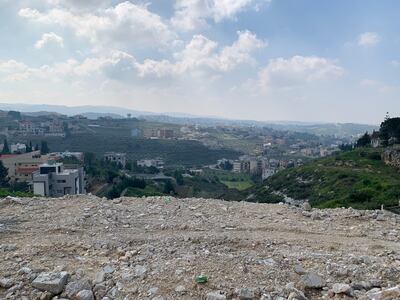Live updates: Follow the latest news on Israel-Gaza
Ziad, his wife Hiba and their three children spend much of their day glued to the news at their home in Jouaiya, a Lebanese village just 15km from the volatile border with Israel.
They watch reports of the Israeli destruction of Gaza, protests in Tel Aviv, and of the war being waged across the Lebanon-Israel border.
“It will come to us, I feel it will come to us,” says the couple's eldest child, 23-year-old Helena, with a nervous laugh.
“They are scared,” says Hiba of her three girls, and Helena “is always preparing her bag to go”.
Seven-year-old Elen, Hiba's youngest, “cries any time she hears something”, she says.
“At night when they are sleeping, they hear the sounds. Boom, boom, boom. The houses shakes.”
So far, Jouaiya, a bastion of support for Lebanese armed group Hezbollah, has been largely spared in Israel's intense and daily bombardment of southern Lebanon.
But surrounding villages have been hit regularly and the sounds of war have become a constant as the conflict intensifies and expands from the immediate border area.
When The National travelled along a nearby road on Sunday it was quiet. But 24 hours later an Israeli attack on the same stretch killed a Hezbollah commander in his car.
As the conflict expands, the key question facing the residents of Jouaiya becomes more urgent – should they stay or should they go?
“If its gets worse then we will leave [for Beirut],” says Ziad, 52.
“If they start bombing Jouaiya, if they start killing civilians, of course we will leave,” he adds, listing all the neighbouring villages that have been hit.
The family describe an almost predictable routine: from 6am until around 10 or 11am things are quiet, then typically the exchanges of fire between Israel and Hezbollah start again.
“It’s very bad and getting worse and worse. We are always watching the news,” Hiba says.
When Ukrainian President Volodymyr Zelenskyy appears on the TV screen, the conversation turns to the contrasting stance of the West; supporting and arming Ukraine after Russia's 2022 invasion, but doing little to stop Israel's brutal bombardment of Gaza.
As the spokesman for Yemen's Houthis appears on screen, the family say they did not know who Hamas spokesman Abu Obaida or Palestinian Islamic Jihad spokesman Abu Hamza were before the Gaza war, but now they do.
Throughout the village, famed for its olives and surrounded by rolling green hills, the situation is the same – all everyone talks about is the war.
Conflict with Israel is not a new scenario for Jouaiya's residents. The village was evacuated during the deadly month-long war between Israel and Hezbollah in 2006, the last time the two sides engaged in a full-scale conflict.
The situation is not yet as extreme as 2006, but there is a palpable sense that things will get worse.

Israel “has always done it. They have history,” says Hiba
Unlike other communities in southern Lebanon, few residents have left Jouaiya since hostilities commenced on October 8.
In a narrow residential street, Mouhamed, 33, still keeps his small convenience shop open even though business is down. He says people are saving their money in case they need to leave. All his customers want to talk about the conflict, and what they will do if Jouaiya becomes engulfed.
“The situation is fine until the planes start bombing. We need the war to stop because we are in constant state of instability,” he says.
Everyone in the village agrees that the situation is getting worse by the day. “If the war starts and we can run away, we will do. If not we will die here,” Mouhamed says.
If anything, he is more scared than he was in 2006, because now he has a wife and child.
Signs that a ceasefire might be imminent in Gaza have raised fears that Israel will turn its attention to south Lebanon.
Israeli Defence Minister Yoav Gallant indicated on Sunday that Israel planned to increase attacks on Hezbollah in the event of a ceasefire in the Gaza conflict.
But in facing Hezbollah, Israel would be facing a far more potent threat than that in Gaza, where nearly 30,000 Palestinians have been killed in its military's onslaught.
Residents of Jouaiya insist they want peace, but there is an unmistakable affection for Hezbollah and the perceived protection it provides locals.
The group helped to end Israel's 15-year occupation of south Lebanon in 2000 and is typically seen as the victor in the 2006 war.
“We are Hezbollah,” says Hiba. “We are with the resistance against Israel.
“Everyone [here] supports Hezbollah against Israel, it’s in the blood,” she says, while adding “no one likes war”.
The community in Jouaiya is strong and tightly knit, one where everyone knows each other.
And even for those thinking of leaving, Jouaiya will always be home, even if they have to evacuate temporarily.
“This is our house, we cannot leave,” says Helena.
Adnan, 60, has witnessed all of the wars that have come to the village.
“2006 was worse, but if the war happens it will be more dangerous than 2006. But I'm not afraid, I will stay here. I trust God.
“I could die in the war, I could die walking along this street and falling down.”

